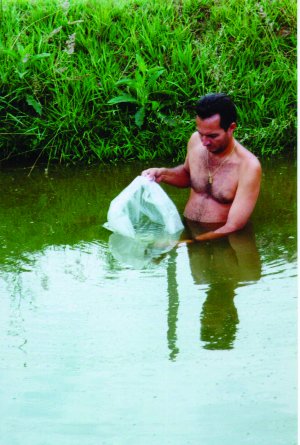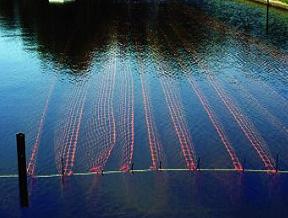|
21 October 2025
|
|
|
മലയാളം
|
|
|
|
|
|
Stocking
The type of pond preparation to be adopted before stocking is based on the type
of culture and its intensity and nature of the culture pond. Liming of the pond
assumes great importance than in the case of freshwater fish culture. The application
of fertilisers is restricted in case pelletised feed is used. However, occasionally
cow dung, single super phosphate, urea etc. can be applied on assessing the productivity.
The stocking density normally varies from 4000 to 50000 PL/ha depending on the type
and intensity of the management practices. The culture system may be monoculture
or polyculture with carps. In case of polyculture with carps the more pond depth
is preferred at 4-5 feet. In case of polyculture the stocking density of prawn may
vary from 2500-20000 post larvae. The carp fingerlings may be of the order of 500-2500
nos. Nursery may be incorporated where the post larvae obtained from hatcheries
could be reared for a period of 4-5 weeks till they attain 40-50 mm or 1-3 gm.
In order to get desired production, feeding, aeration, water exchange, periodic
monitoring should be continued. The quality and type of feed is based on culture
system. Macrobrachium with its omnivorous feeding habits can make use of
a variety of feeds from common wet feed made from rice bran and oil cake to scientifically
formulated pelleted feed. The rate of feeding is determined by the stage of growth
of prawn, water quality, density of stock and other manuring practices. Generally
the feeding rate my be 5% of the body weight.
The duration of culture varies from 6 to 12 months depending on the type of culture
practice. Generally in monoculture the culture period may be 6-8 months under monoculture
and 8-12 months under polyculture. The average growth of prawn may range from 50
gms to 200 gms depending on the duration, density, water quality, feeding etc. The
survival rate may range 50% to 70% depending on the type of management practices.

Stocking of post larvae after acclimitization

Artificial substrate for post larval settlement
Top
|
|
|
|
|
|